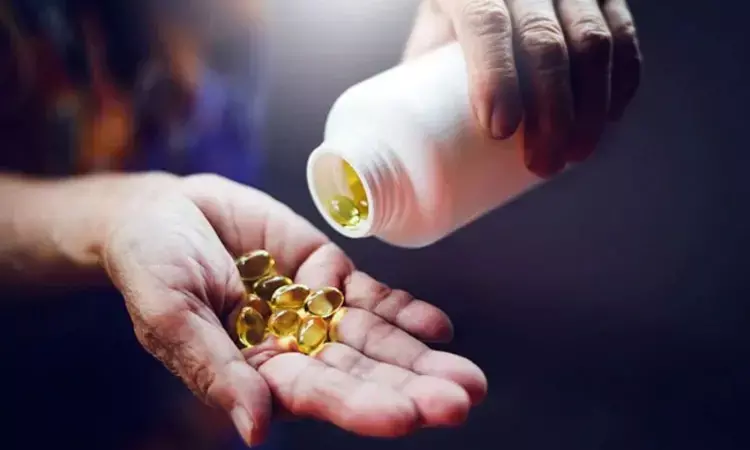- Home
- Medical news & Guidelines
- Anesthesiology
- Cardiology and CTVS
- Critical Care
- Dentistry
- Dermatology
- Diabetes and Endocrinology
- ENT
- Gastroenterology
- Medicine
- Nephrology
- Neurology
- Obstretics-Gynaecology
- Oncology
- Ophthalmology
- Orthopaedics
- Pediatrics-Neonatology
- Psychiatry
- Pulmonology
- Radiology
- Surgery
- Urology
- Laboratory Medicine
- Diet
- Nursing
- Paramedical
- Physiotherapy
- Health news
- Fact Check
- Bone Health Fact Check
- Brain Health Fact Check
- Cancer Related Fact Check
- Child Care Fact Check
- Dental and oral health fact check
- Diabetes and metabolic health fact check
- Diet and Nutrition Fact Check
- Eye and ENT Care Fact Check
- Fitness fact check
- Gut health fact check
- Heart health fact check
- Kidney health fact check
- Medical education fact check
- Men's health fact check
- Respiratory fact check
- Skin and hair care fact check
- Vaccine and Immunization fact check
- Women's health fact check
- AYUSH
- State News
- Andaman and Nicobar Islands
- Andhra Pradesh
- Arunachal Pradesh
- Assam
- Bihar
- Chandigarh
- Chattisgarh
- Dadra and Nagar Haveli
- Daman and Diu
- Delhi
- Goa
- Gujarat
- Haryana
- Himachal Pradesh
- Jammu & Kashmir
- Jharkhand
- Karnataka
- Kerala
- Ladakh
- Lakshadweep
- Madhya Pradesh
- Maharashtra
- Manipur
- Meghalaya
- Mizoram
- Nagaland
- Odisha
- Puducherry
- Punjab
- Rajasthan
- Sikkim
- Tamil Nadu
- Telangana
- Tripura
- Uttar Pradesh
- Uttrakhand
- West Bengal
- Medical Education
- Industry
Pregnancy Vitamin D Supplementation Linked to Better Bone Health in Children: Study Finds

UK: A recent randomized controlled trial has highlighted the potential benefits of vitamin D supplementation during pregnancy, showing its positive impact on offspring bone health in mid-childhood. The findings suggest that mothers taking cholecalciferol (1000 IU/day) during pregnancy had children with higher bone mineral density (BMD) and greater lean mass compared to those whose mothers received a placebo.
The findings from the exploratory post-hoc analysis, published in The American Journal of Clinical Nutrition, indicate a clear association between maternal cholecalciferol use and improved bone health outcomes in their children.
Bone mineral density is a key marker of bone strength and overall skeletal health, and the research suggests that sufficient vitamin D during pregnancy could serve as a public health strategy to combat childhood bone-related disorders. Vitamin D plays a vital role in calcium absorption, which is critical for developing strong and healthy bones.
The Maternal Vitamin D Osteoporosis Study (MAVIDOS) trial provided evidence that gestational cholecalciferol supplementation positively influenced offspring bone mineral density (BMD) at age 4. Establishing whether this effect persists into later childhood is essential to determine if maternal vitamin D supplementation could be an effective public health strategy for improving long-term bone health. To this end, Rebecca J Moon, MRC Lifecourse Epidemiology Centre, University of Southampton, Southampton General Hospital, Tremona Road, Southampton, United Kingdom, and colleagues explored whether gestational vitamin D supplementation leads to increased offspring BMD at ages 6–7 years through a post-hoc analysis of data from the existing trial.
In the MAVIDOS randomized controlled trial, pregnant women under 14 weeks of gestation with singleton pregnancies and serum 25-hydroxyvitamin D levels between 25–100 nmol/L at three UK hospitals (Southampton, Sheffield, and Oxford) were randomly assigned to receive either 1000 IU/day cholecalciferol or a placebo. This supplementation began between 14 and 17 weeks of gestation and continued until delivery. Children born at term to mothers recruited in Southampton were invited to participate in the childhood follow-up at ages 4 and 6–7 years.
The children underwent dual-energy X-ray absorptiometry (DXA, Hologic Discovery) scans of the whole body excluding the head (WBLH) and lumbar spine. Measurements assessed bone area, bone mineral content (BMC), bone mineral density (BMD), and bone mineral apparent density (BMAD). Linear regression analysis was applied to compare the two groups while adjusting for potential confounding factors such as age, sex, height, weight, duration of breastfeeding, and vitamin D use at ages 6–7 years.
The analysis uncovered the following findings:
- A total of 454 children were followed up at ages 6–7 years, with 447 having a usable DXA scan.
- Gestational cholecalciferol supplementation was associated with higher whole-body less head bone mineral content (WBLH BMC), bone mineral density (BMD), bone mineral apparent density (BMAD), and lean mass compared to the placebo group.
- Specifically, WBLH BMC was 0.15 SD higher, BMD was 0.18 SD higher, and BMAD was 0.18 SD higher. Additionally, lean mass was 0.09 SD higher in the cholecalciferol group.
- The effects of gestational cholecalciferol supplementation on bone outcomes were consistent at ages 4 and 6–7.
"We showed that pregnant women who took 1000 IU/day of cholecalciferol during pregnancy showed higher offspring bone mineral density (BMD) and lean mass in mid-childhood compared to those who received a placebo, according to an exploratory post-hoc analysis," the researchers wrote.
"These findings highlight that vitamin D supplementation during pregnancy could serve as a key public health strategy to enhance bone health in children," they concluded.
Reference:
Moon RJ, D' Angelo S, Curtis EM, Ward KA, Crozier SR, Schoenmakers I, Javaid MK, Bishop NJ, Godfrey KM, Cooper C, Harvey NC; MAVIDOS Trial Group. Pregnancy vitamin D supplementation and offspring bone mineral density in childhood follow-up of a randomized controlled trial. Am J Clin Nutr. 2024 Nov;120(5):1134-1142. doi: 10.1016/j.ajcnut.2024.09.014. Epub 2024 Sep 19. PMID: 39306330; PMCID: PMC11600048.
Dr Kamal Kant Kohli-MBBS, DTCD- a chest specialist with more than 30 years of practice and a flair for writing clinical articles, Dr Kamal Kant Kohli joined Medical Dialogues as a Chief Editor of Medical News. Besides writing articles, as an editor, he proofreads and verifies all the medical content published on Medical Dialogues including those coming from journals, studies,medical conferences,guidelines etc. Email: drkohli@medicaldialogues.in. Contact no. 011-43720751


